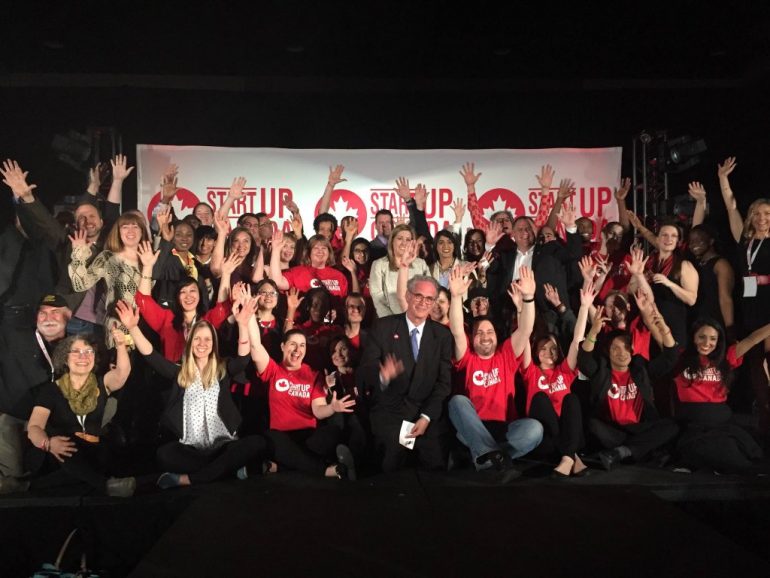Last week, 1,500 startup founders, policy makers, and industry leaders touched down in Ottawa for Startup Canada’s Day on the Hill, which brought all stakeholders together to shape Canada’s innovation agenda. With speeches, panels, and policy hackathons scattered in between sessions, the overall goal was to define specifically what works and what doesn’t when it comes to fostering strong Canadian companies.
The morning kicked off with Globalive founder and chairman Tony Lacavera, who touched on both the issues affecting entrepreneurs that politicians should consider, and what startups can do to make their voices heard on the global stage.
“The system is complicated for a reason. You guys deal with business tensions, and we get that, but we’re trying to encourage job creation. ”
Like Thalmic Labs CEO Stephen Lake has said in the past, the government needs to increase its support of companies in the tech sector, where most of the world’s jobs will be. “I would encourage governments to err on the side of supporting the job creators of tomorrow—the Canadian small businesses and startups—as opposed to mature companies, companies with the means to succeed on their own or those in declining or obsolete industries.”
At the same time, Lacavera pointed out that the onus was also on our home-grown VCs and funders to build the foundation for an ecosystem friendly to first-time Canadian entrepreneurs. “We need to embrace failure, for ourselves and for the people we invest in. I believe that if you haven’t failed once, you haven’t learned enough. Failing builds character and resilience, and it prepares us for what’s ahead,” said Lacavera. “Yet too many in the VC industry shy away from people who didn’t succeed the first time. This needs to change.”
Intuit Canada is proud to have been apart of #StartupDay on the Hill! Together we can Build an Innovation Nation https://t.co/hjDipEU8jx
— Intuit QuickBooks CA (@QuickBooksCA) May 6, 2016
Wattpad CEO and founder Allen Lau also touched on the oft-discussed difficulty of bringing in foreign talent to Canada. As it can take months to bring in foreign workers to Canada, these highly-skilled workers often end up choosing other offers. Lau said that the current system was designed for the industrial economy to protect Canadian jobs, but doesn’t work in the new information economy. “In the new information economy, it doesn’t work this way. Because we don’t worry about protecting our jobs in the same way — we want to disrupt our own jobs so we can advance our company,” said Lau. “The thinking is very different. For those leaders that we could bring in, they can build a hundred amazing companies here and those amazing companies can attract thousands of people.”
Sitting on a panel with Lau, Arif Virani, Parliamentary Secretary to the Minister of Immigration, Refugees & Citizenship, said that he understood the perspective of entrepreneurs. However, entrepreneurs also needed to understand that the government is accountable to the larger Canadian population. “The system is complicated for a reason. You guys deal with business tensions, and we get that, and we’re trying to encourage business and job creation. But we deal with a reality that we want growth and that we are accountable to that growth to the Canadian public,” said Virani. “I appreciate what you’re saying that if it was easier to hire a Canadian you would just to do that, but from our perspective we need to be assured that the effort to hire Canadians is done at the outset.”
.@allenlau saying there are lots of skills that @wattpad can't train employees for. Have to come from experience. #StartupDay
— Douglas Tr0n Soltys (@tron) May 5, 2016
As Canada builds its innovation strategy with the input of entrepreneurs, Tonya Surman, founding executive director and CEO of the Centre for Social Innovation, said that Canada has the potential to be a leader in the area of social entrepreneurship. It’s an area that’s in line with the Canadian government’s vision, as part of the federal budget includes $130 million over five years to cleantech ventures.
“Ultimately, when we’re looking at how to position the global brand for Canada, we are increasingly becoming leaders in social entrepreneurship. But what does that mean? For me, it means focusing on what kind of enterprises we want to create,” said Surman. “What is the vision that we have for Canada, and how can harness the power of entrepreneurship and market forces and use those forces to solve pressing challenges? How do we bring solutions to community? My vision of our Canada is not just creating jobs but creating meaningful work.”


